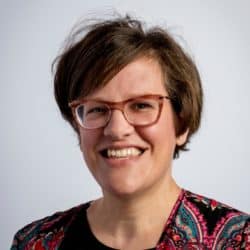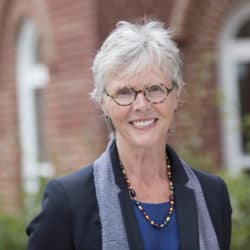As we mark the 150th anniversary of confederation, The Philanthropist is profiling Canadians from across the non-profit sector and putting a face to 150 individuals who work or volunteer in Canada’s social sector.
Name: Cheryl Zaw
Current role in the sector: Executive Director of Inuvik Youth Centre
What was your first job in the sector or a defining moment?
I spent one year living/interning in a predominantly African-American neighbourhood in Oakland, California at the start of my career. The impact on my learning about race, colonization, poverty and discrimination from that first experience continue to shape in a core way everything I do to this day.
Describe your desk/workspace.
It’s a busy space with books and drawings, toys and project materials all around. I appreciate the large windows that draw me into what is happening in the centre. Overall it’s definitely a space driven by function more than aesthetics, but that’s a description that generally describes my life as well, so it fits.
What are you reading or following that has expanded your understanding of the non-profit sector?
The most recent physical book I’ve read was Jonah Lehrer’s Imagine: How Creativity Works. I spend a lot of my reading time floating through Facebook and Twitter, grabbing up pieces of wisdom from the larger community. I recently had the opportunity to have an author in my home and community for a week exploring my practice and context, and I’ve got to say there’s nothing that expands my understanding of the sector like putting my own practice and experience under the microscope in that way.
What do you think our sector needs to be thinking about?
What shows up a lot for me in my work is the theme of trauma and the question of how we respond consistently to the varying levels and experiences of trauma that people carry with them. The work of resolving trauma on the individual level, paired with the process of exploring systemic injustices on a broader social scale is something that I’m always exploring and working to find new ways forward. I’m also very interested in the development of theory and tools around developing trust and building community. The best questions I’ve found are “How can we see the individuals we serve as assets rather than liabilities?” and “how do we use the strengths of marginalized individuals to solve their own problems while building up the whole community?”.
Do you know someone we should profile as part of this series? Email us at philanthropistprofiles@gmail.com


